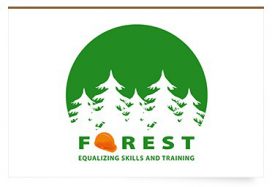GODANUBIO – Participative Ecosystems for fostering the revitalization of rural-urban cooperation through governing Danube Circular Bioeconomy
Danube regions and cities face major societal transitions regarding demographic change. The rural exodus is caused by better employment opportunities for the youth and the prospect of a better life in cities. The movement of labor leads to depopulated areas leaving an aging and increasingly unskilled population behind. A multi-level participative governance approach and new
- Published in In Progress, Projects
Project FOREST
Project FOREST replies to the fragmentation of competences in forestry management at national and international levels, by giving rise to debate around the possibility to create a standard level of competences and skills of forestry workers and promoting innovation and professionalism by joint actions and initiatives. Debates will be channelled into three levels: technical concerning
- Published in Activities, Events & Networking, Projects
JOIN THE PROJECT: Ventilation Replacement, Safety at Work and Energy Efficiency!
At the beginning of this year the project “Protection at Work to Energy Efficiency” by the Croatian Wood Cluster started. According to recent research, by replacing old exhalation systems, it is possible to increase the company’s energy efficiency by up to 30 percent. At the same time, with the installation of newer generation ventilation systems,
- Published in Activities, Projects
FORESDA – Transnational Strategy on Boosting the Regional Innovation Systems Released with Clear Priority: More Innovation within Forest-based Sectors
As planned within FORESDA project (Interreg Danube Programme) project, the Transnational Strategy on the fostering of cross-sectoral, transnational innovation and strengthening of ecosystems is released in the end of December 2017. The Strategy lays out the plan that should open up, broaden and contribute to the further development of the forest-based sectors’ (FBIs) research innovation
- Published in Projects
Interreg projects FORESDA and DanuBioValNet presented at the conference on EU funds. Great response from regional companies and institutions
In Sarajevo, on the 6th of October, gathered more than 80 stakeholders from the forestry and woodworking sector with the aim of exchanging opinions and obtaining the latest information on EU funds and sectoral lobbying. The conference was organized by the Croatian Wood Cluster and the University of Bihac, with the support of the Chamber
- Published in Activities, Calendar, Events & Networking, Held, Press Releases, Projects
Join the conference in Prague! Strengthening bio-based industries and clusters through the DanuBioValNet project
On Thursday, March 30, in Praque will be held the first kick-off conference of the international project DanuBioValNet. The project is co-financed from the EU funds (ERDF, IPA) and its objective is cross-clustering partnership for boosting eco-innovation by developing a joint bio-based value-added network for the Danube Region. Project activities began in early January and
- Published in Activities, Announcements, Calendar, Events & Networking, Projects
Invitation to the Presentation of the EU Project in Ljubljana. Get Involved with FORESDA by Encouraging Innovation and Competitiveness!

Earlier this year started the activities within the international project FORESDA, which aims to transform the traditional forest-based areas into innovative, modern areas and to improve or reconfigure the existing value chains. The project will be implemented in the Danube area, that is 9 partner countries – Austria, Bosnia and Herzegovina, Bulgaria, Germany, Hungary, Romania,
- Published in Activities, Announcements, Calendar, Events & Networking, In Progress, Planned Activities, Projects
Archives
- July 2022
- March 2022
- December 2021
- April 2021
- December 2020
- September 2020
- July 2020
- March 2020
- September 2019
- August 2019
- July 2019
- April 2019
- March 2019
- February 2019
- November 2018
- October 2018
- August 2018
- July 2018
- May 2018
- April 2018
- March 2018
- February 2018
- January 2018
- November 2017
- October 2017
- July 2017
- May 2017
- March 2017
- February 2017
- October 2016
- September 2016
- June 2016
- April 2016
- February 2016
- August 2015
- June 2015
- March 2015
- January 2015
- December 2014
- November 2014
- October 2014
- September 2014
- August 2014
- May 2014
- March 2014


